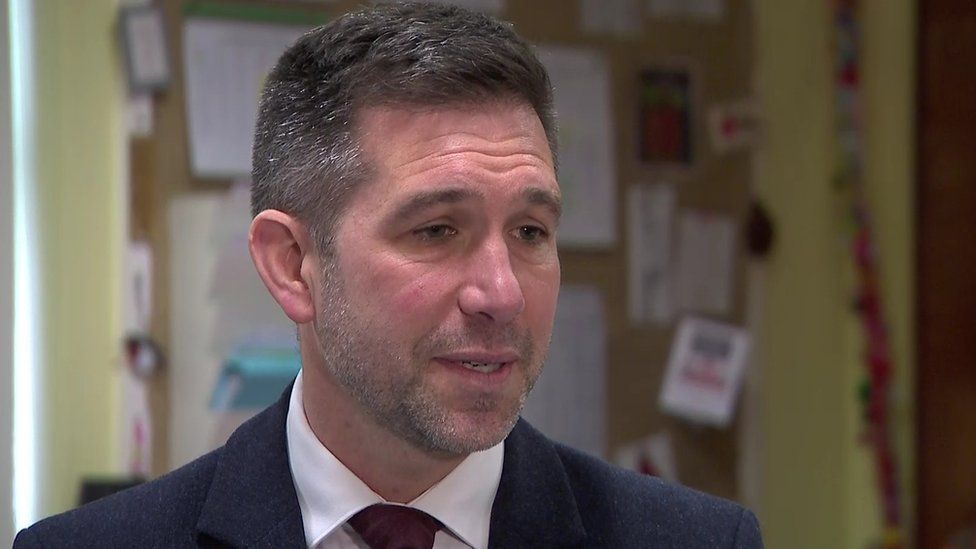
Principal Chris Currie said much of his time is spent fundraising for “basic resources and services” for his pupils
By Darran Marshall
BBC News NI
A primary school principal has said the pressures on his school budget are so great that he is having to “operate as a charity”.
Chris Currie from Killinchy Primary in County Down said it is now “impossible” to work within his allocated budget.
He said he spends much of his working week on fundraising for basic services.
Last month, the Department of Education wrote to schools warning public service budgets for the 2024/25 financial year would be “extremely challenging”.
Mr Currie told the BBC’s Sunday Politics programme: “We simply don’t have enough money coming in from the Department of Education to run our school.
“It can’t be done. It’s as simple as that,” he said.
“Our basic staff costs that we need to run the school is well in excess of 100% of our budget. Therefore the books can’t be balanced. It’s not possible.”
He said an additional £45,000 was spent on running costs, such as heating and electricity.
“Before we even switch on a light we are well in excess of our delegated budget.”
Killinchy Primary School opened in 1983 and celebrated its 40th anniversary last year
One cost-cutting measure the school has had to take was to merge some classes.
But Mr Currie warns that “results in larger class sizes, more complex teaching arrangements, and that has an impact on pupils as well”.
“Over the past eight or nine years there’s been a slow burn of an erosion of services that we have been able to offer.”
Books held together with sticky tape
He told BBC News NI that the school’s parent-teacher association (PTA) had to raise significant funds to allow the school to replace three interactive whiteboards which had stopped working.
“At one point three went down in very quick succession, leaving those classrooms without interactive whiteboards or any tool for front-of-class teaching.
“We had to raise the money from PTA funds to replace those.”
New screens have been bought to replace faulty whiteboards
A further £10,000 was raised to allow the school to replace reading books, some which were almost 10 years old, some with missing pages, others held together with sticky tape.
Killinchy Primary School has more than 300 pupils and Mr Currie said a significant amount of his time is now dedicated to fundraising efforts for “basic resources and services”.
“I could be spending my time in more productive ways. It’s not what I’m supposed to be doing,” he said.
The school has a staff of approximately 45 people
Mr Currie acknowledge his school’s situation is not unique. As chair of the National Association of Head Teachers’ Primacy committee he is in regular contact with other headteachers.
“Fundraising has become part and parcel of what we all have to do as principals now. That’s charitable work.
“We are asking for donations and doing activities that are solely designed to raise money so that we can provide the best experience we can for our children. We simply cannot provide it without those charitable donations.”
“We are not unique by any stretch. Every school that I am in contact with is experiencing exactly the same thing.
“We simply cannot offer what we used to be able to offer.”
Also speaking on Sunday Politics, Nick Mathison, chair of the Northern Ireland Assembly’s Education Committee, said that “before a light is turned on, schools are struggling to balance the books”.
“There are many aspects to this but schools do need more money to actually be able to deliver education for our children,” the Alliance MLA said.
“Schools put on a really, really good front for parents,” he added. “But behind that, we literally, in some cases, have buildings that are crumbling and [are] hearing about fundraising for what I would consider to be basic essential resources for a school.”
Mr Mathison also said there had been “an absolute failure of planning to deliver for places for children with special educational needs” in NI schools and that money “will need to be found” for classroom assistants.
Last month the permanent secretary of the Department of Education, Mark Browne, wrote to schools to provide them with an update on the financial planning position.
The Northern Ireland Executive has yet to agree an overall budget for all public services in Northern Ireland for the 2024-25 financial year.
Mr Browne told schools that the executive “anticipates that the financial position facing out public services, included education, will be extremely challenging”.
A budget is expected to be agreed towards the end of April.








